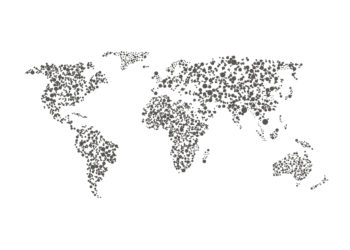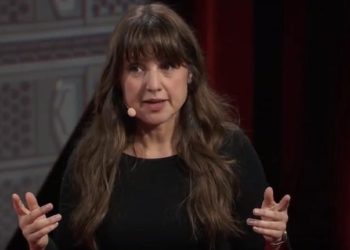Editor’s Note: Today’s post is by Andy Nobes, Programme Officer for Research Development and Support at INASP.
For those who are privileged to be able to access around-the-clock online news, social media, and international research literature, it’s impossible not to have noticed that the world is faced with multiple major threats — ‘wicked problems’ as they are often called. The challenge of sustainable energy, the threat of climate change and infectious diseases, and poverty are truly global challenges more now than ever, affecting both the Global North and South.
Innovative scientific and academic research that combines talent across international borders has the potential to solve many of these problems. As Professor Tyrone Pretorius, vice-chancellor of the University of the Western Cape in South Africa, has rightly pointed out:
“It will not be a single scientist working in isolation in his or her laboratory that will make an impact on the challenges.”
International collaboration, as measured by co-authorships, has continued to increase and broaden geographically over the previous decade, and research outputs in the Global South have also increased, although they still make up a small percentage of global outputs. For example, Sub Saharan Africa apparently accounts for less than 1% of global output (which is nevertheless double what it was a decade ago), while representing 12% of the global population, hinting at a significant research potential that is yet to be fully realized.

Barriers to the participation of the Global South
Some of the brightest and best (and well-connected) researchers in the Global South are already able to take advantage of collaborative opportunities. However, finding overseas research partners and opportunities are significant challenges in the South, exacerbated by institutional funding to travel and attend conferences being very limited.
In addition, while there are a growing number of digital tools for collaboration, researchers in the South are not always in a position to fully utilize them due to low internet bandwidth and limited digital literacy skills. ResearchGate is commonly used by researchers, but it’s more likely to be used for profile building, archiving, and sharing papers. Online tools such as Authorea and OverLeaf provide innovative solutions in collaborative writing for researchers, but only if researchers have found suitable partners to work with beforehand.
Another challenge is that research in the South is often dependent on foreign funding for research projects, which can dictate research agendas and requires researchers to have strong proposal writing skills (in English, of course). In some cases, funding calls require research partners in specific fields or regions in which they have no existing contacts. I have responded to emails in the last few months from researchers in Africa who wanted to apply for a funding call (with a challenging deadline) that would fund their current research idea but they needed, and were struggling to find, an eligible European university with which to partner.
And it is not just ‘North/South’ collaboration that is crucially important. Recent research has identified a very real need for increased ‘South/South’ partnerships to overcome challenges unique to the Global South. Establishing such connections is equally as challenging.
At INASP (where I work as a Programme Officer in our Research Development and Support team), we’ve been attempting to address many of these issues through the AuthorAID project, which celebrated its tenth anniversary last year. Our website provides a free support platform for researchers with an online mentoring system, and free resources and online courses in proposal writing and research communication. The platform is currently used by more than 17,000 global researchers – mostly from Africa, Asia and Latin America. Over the past year, more than 3,200 of these members (and 99% of new members since the option has been available) have marked themselves on their online profile as ‘open to collaboration’ in a wide number of different development topics including agriculture, healthcare/medicine, environmental sciences, and business.
In addition, a survey of members we carried out in 2017 found that the majority (95%) of researchers in the Global South need help and support in finding research collaborators. Respondents identified a need for some form of online space for thematic discussions around collaboration topics, and an interactive platform for researchers to post details of their research and/or funding, and seek collaborators.
Many researchers in our community want to collaborate with a wide range of other stakeholders, both in-country and internationally, in their own subject area and in multi-disciplinary work. They want to embark on ambitious research projects that address the development problems they see in their own countries, but they don’t always have the capacity, contacts and resources (or the know-how to jump through bureaucratic funding hoops) of those in the Global North to make these research goals a reality. The key skills that survey respondents say they look for in collaborators include writing, applying for funding, and international experience.
On top of these findings, another challenge that was identified was maintaining research relationships once they had been established. Many researchers reported that, after successfully finding collaborators, projects quite often broke down, or communication and enthusiasm fizzled out. There was not always clarity in roles and responsibilities (particularly around funding and authorship), setting goals, and project scheduling, perhaps due to lack of experience in these areas. Researchers expressed a need for advice and resources/frameworks on the increasingly complex world of cross-border, cross-cultural relationships and power balances.
In response to these findings, we have further developed the AuthorAID online platform with a new forum area. This includes a ‘Research Collaboration Space’ that offers an opportunity for researchers to post details of their research projects and put out a call for collaborators. The new platform is intended as both a collaboration hub and a support network. It sits alongside a forum for research communication discussion and support, which is moderated by experienced volunteer mentors and facilitators. It also sits alongside a forum for finding and sharing funding, scholarships, and other opportunities, which is crowd-sourced by the AuthorAID community. There are also sub-forums for women researchers, librarians and journal editors.
But, of course, having an online platform means little without a living, breathing community. We have experienced first-hand the enthusiasm of researchers in the Global South when provided with online support and networking opportunities. For example, over 50% of participants have completed our MOOCs in research and proposal writing — a much higher success rate than the global average. And at least 10% of these participants have reported staying in touch with other researchers for potential collaboration. Hundreds of researchers have also been able to connect with online mentors via the AuthorAID website, with 60% reporting that they published journal papers as a result of these online relationships. We are confident therefore that the contagious enthusiasm of our community will attract more researchers and other interested parties from all over the world who can contribute to the discussion and peer support. In fact, since we announced this platform last week we have already seen discussions occurring about collaboration around several research topics.
The power of equitable collaboration
Research collaboration can be very powerful, and researchers have very practical reasons for seeking collaborations. They can provide access to new and innovative approaches to problem-solving, as AuthorAID mentor and facilitator Professor Richard De Grijs says:
“It is a great way to establish a worldwide network of colleagues with a variety of backgrounds – scientific, cultural, or otherwise.”
They can also, of course, provide a gateway to skills and equipment that researchers and institutions do not possess – in the words of Professor Adetokunbo O. Lucas, a Nigerian Adjunct Professor at the Harvard School of Public Health, collaboration can be:
“… a valuable mechanism for advancing knowledge and strengthening research capacity. It makes modern research tools available to institutions and countries that would not normally be able to provide them from their own resources.”
However, he warns us that:
“Such projects should be carefully monitored to ensure compliance with ethical standards and maintenance of a proper balance in the influence of the cooperating partners.”
This is an important warning. We hear much about imbalances from researchers we work with. Often, they find themselves as the junior partners or data-gatherers in international projects in their country, despite their superior local experience. Even worse, they sometimes find themselves ignored by visiting researchers who don’t consult or include them on large overseas-funded research projects taking place in their own fields and industries.
Those who have influence in the Global North, whether publishers, researchers, editors, or policymakers, are in a position to address this imbalance in one way or another. In a recent Scholarly Kitchen post collated by my colleague Siân Harris, Tanzanian fisheries researcher Ismael Kimirei, who has plenty of experience of international collaboration, called on Northern researchers to engage Southern researchers as equal partners, and empower them with the resources they need:
“Collaborate with them as intellectual equals, and not as data collectors or logistics officers, which unfortunately is currently the case. Inclusive collaborations are important. Give them training opportunities. Include capacity building in your research budgets to train them and equip their laboratories. When you write papers, give them equal opportunity to actively participate in the writing process. Above all, involve them in the idea development process such that they will build their research and proposal writing muscles.”
International research collaboration may be the key to overcoming major global challenges, but we believe that researchers in the Global South need to be involved in this process as equal partners if it is to be truly impactful.
The new AuthorAID collaboration space is an attempt to address some of these issues, bringing a diverse range of people together to solve global challenges by providing the space and potential to seed discussion and opportunities around research collaborations that can attract funding, and develop innovative ideas. We also hope the forum will provide support and advice for inexperienced researchers who are looking to reach out to global colleagues for the first time. We welcome anyone in the Global North or South with an interest in research – whether an academic, clinician, publisher, funder, or policymaker – to visit the forums to share their research interest, contacts, knowledge and skills, or simply offer advice and ideas to the wider community. We can all do our part.
I’ll finish with a quote from Nigerian surgeon Zainab Yunusa-Kaltungo, an AuthorAID member who was involved last year in facilitating our online courses in research and proposal writing:
“Creating platforms for mentoring and collaboration between Northern and Southern researchers holds the endless potential of rightly guiding the ‘underdogs’ of research, increasing the quality and visibility of their work and ultimately achieve the aim of increasing diversity in scholarly publishing.”
- The new collaboration area can be accessed via the AuthorAID website at authoraid.info. Many of the readers of this post may be researchers or come into regular contact with researchers. Please do share this announcement with anyone who might be interested and help create valuable collaborations with researchers in the Global South.
Discussion
5 Thoughts on "Guest Post: New Platform Facilitates International Research Collaboration to Help Solve our Biggest Global Challenges"
Thanks for posting Andy/Sian, very informative, and helpful to be kept up to date on the excellent work you are all doing at INASP !
So the thing that will revolutionize research collaboration is … a forum? Seriously?
I think you do him a disservice. He doesn’t mention revolutionizing but he does say it “is an attempt to address some of these issues”
Dear J, my response is coming from my being a beneficiary of the authoraid platforms and seeing the endless possibilities for the global south and by extension the north. Authoraid in my opinion has, and is revolutionizing research knowledge dissemination and collaboration in simple, affordable and convenient ways a few researchers at a time. As they say slow and steady wins the race.
If you’d just sign on as a guest facilitator or even an observer (I’m sure Andy and Sian would create such a position 😊) for one of the research writing courses, you’d get a first hand experience of what I’m trying to communicate. You only need read the comments of the participants at the end of the course.
Best wishes.
Great post / project, Andy. I think you’re right that the big challenge is not providing the platform, but getting the “target audience” to engage with it. Is there a plan / budget for encouraging more researchers from the Global North to find the platform and add their voices? I’m sure that many would be happy to “do their part” but you will need to promote the service so people actually know about it. Institutions, publishers, funders and societies could all play a role and it may not be as much about budget as about having a co-ordinated message.
On a related note, on a recent trip (which I might write up in more detail for the Kitchen) I learned how much prejudice there is against research / data from the Global South (e.g. journals that don’t trust and won’t publish “regional” data). On the other hand an academic working in the region I visited shrugged and agreed that he would not even try to publish his “local” research because he knew it would not withstand peer review from the Global North. I can see that the AuthorAid forum could be a great channel for collaboration and mentoring, and learning in both directions, but – in addition to the challenges of awareness – I guess there are challenges around incentives. Are researchers from the Global North going to be able to carve out time to provide support, guidance etc, even if they want to?
I’m thinking aloud. Pondering whether more funding could be secured to do some marketing, at least. And thinking about credit mechanisms to tie researchers’ contributions via AuthorAid into their institutions’ “corporate social responsibility” goals or similar.



